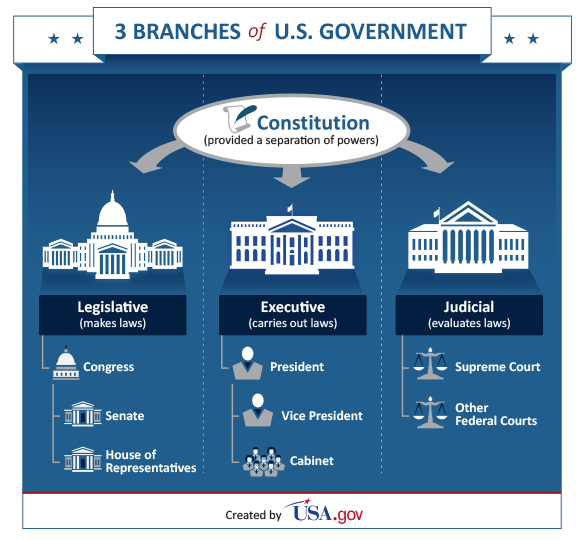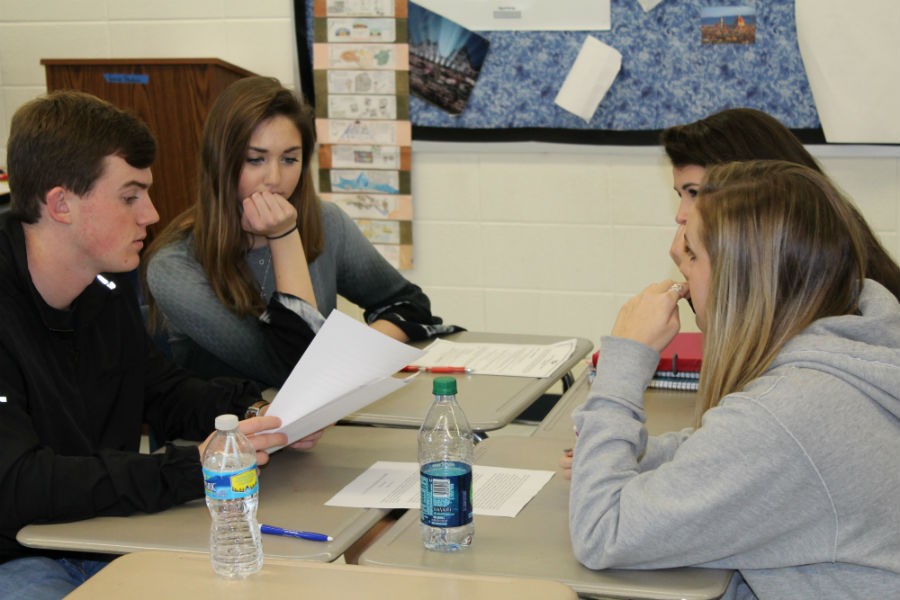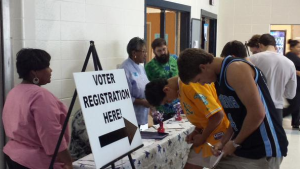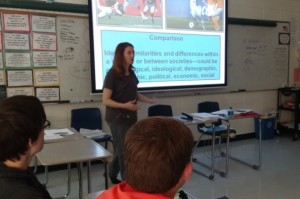A student’s guide to politics
Understanding the ins and outs of the U.S. government
Diane Ruane’s AP Government and Politics class learns how bills become laws through making and discussing their own bills in committees. Ruane encourages political participation in her students. “I think that although it’s sometime difficult to realize,” senior and government student Maddie Beatty said, “one person can make a huge difference in society. Voting is one of the easiest ways to make your voice heard.”
February 1, 2016
This student’s guide to politics just scratches the surface of the world of government and politics, but its intentions are to teach the basics and spark interest in continued political learning on the road to becoming an active and educated American citizen.
Constitutional basics
In simplistic terms, the United States Constitution, put into motion in 1789, has a preamble and seven articles. The preamble includes the notorious words “We the People of the United States, in order to form a more perfect Union, establish justice, insure domestic tranquility…,” which were made practically unforgettable by the educational Schoolhouse Rock videos. 
The first article is the most expansive and establishes a bicameral legislative branch of government, creating both a House of Representatives based on the population of states and a Senate based on equal representation, as determined in the Connecticut Compromise. This article includes qualifications to become a representative, powers granted to Congress and restrictions on legislation.
The second article continues on to outline the executive branch including the president, and the third discusses the judicial branch of government which encompasses the Supreme Court and all lower courts.
Government teachers Walt Ellison and Diane Ruane, use the phrase “LEJ STATE AMEND NAT RAT” as a mnemonic device to help students remember the articles: legislative, executive, judicial, states’ rights, adding amendments, national supremacy and ratification.
There are 27 amendments to the Constitution, the first 10 being the Bill of Rights. These 10 amendments grant civil liberties, or “the legal constitutional protections of freedoms against government abuse,” according to “Government in America: People, Politics, and Policy.” The remaining 17 amendments are described as civil rights: “policies designed to protect people against arbitrary or discriminatory treatment by government officials or individuals.”
Political socialization
According to Richard E. Dawson and Kenneth Prewitt, co-authors of “Political Socialization,” political socialization is “the process through which an individual acquires his/her particular political orientations– his/her knowledge, feelings, and evaluations regarding his/her political world.”
Similar to day-to-day socialization, political socialization is merely a combinations of influences on a person, resulting in a formulated opinion and certain outlook on how a country should be managed.
Family, religion, nationality and peer groups all contribute to a person’s political socialization. Whether he or she will hold these same values later in life is up in the air, but experiences and surroundings nevertheless hold a major part in shaping individual political stances.
Voting
Voting is the most popular form of political participation. Voting is a basic right granted to United States citizens, which may constitute to the relatively low voting percentages as compared to other countries that implement stricter voting requirements and policies.
Citizens may vote for the election of House Representatives in their respective congressional district, senators in their state or the U.S. president. Voting itself is a simplistic form of being involved in influencing an entire nation.
Georgia has an open primary system in which registered voters are not required to vote in alignment with their political affiliations. Ten other states share this flexible election system, a couple including Alabama and Hawaii.
Primaries are elections in which voters cast their ballots to select candidates for a particular office, the most well-known being the president. The alternative to primary elections is a caucus, which 16 states hold. In this type of election, only members registered to a specific political party congregate to elect a candidate.
The country is in the midst of an election year with the first caucus being in Iowa today. This state election, followed by the New Hampshire primary, is crucial for the candidates and country.
Whichever way the votes lean in these beginning elections can greatly influence the patterns followed by states and their voters to follow. The last primary held will be on June 14 as voters in the District of Columbia wrap up the 2016 presidential candidate elections. A full schedule of the state and territory primaries and caucuses can be found here.
The standing presidential candidates up for election as their party’s nominee follow:
Republican (12)
- Donald Trump (front-runner)
- Ted Cruz
- Marco Rubio
- Ben Carson
- Jeb Bush
- Rand Paul
- Chris Christie
- John Kasich
- Carly Fiorina
- Mike Huckabee
- Rick Santorum
- Jim Gilmore
Democratic (3)
- Hillary Clinton (front-runner)
- Bernie Sanders
- Martin O’Malley
Registering to Vote
The 26th amendment makes it legal for all citizens ages 18 and older to vote and protects their right to do so unabridged. According to the Department of Motor Vehicles, an individual is eligible to register to vote in Georgia if the following requirements are met:
- A United States citizen.
- A legal resident of a Georgia county.
- At least 17 1/2 years old.
- Must be 18 years old before or on Election Day.
Eligibility to vote can be curtailed if an individual falls under the following circumstances:
- Are serving a sentence for a felony conviction.
- Can vote again once sentence requirements are completed.
- Have been deemed by a judge to be mentally incompetent.
Voting registration may be done by mail or in person at a local Georgia Department of Driver Services location. Those who are applying for their class C driver’s license, ages 18 and up, may also register to vote at the same time, as suggested under the Motor Voter Act of 1993. The DMV’s website contains more the specific steps and required documents necessary to register to vote.
Political Participation
Other forms of political participation are not limited to just registered voters. Political participation includes all the activities used by citizens to influence the selection of political leaders or the policies they pursue.
Voting, supporting political campaigns, donating, joining activist groups and running for office are considered conventional activities. Boycotting, protesting, petitioning and staging demonstrations fall under the umbrella of unconventional political participation. These, although not as common or reserved as conventional forms, are not illegal.
The line of legality is drawn near to that of the bounds of common sense. Vandalism and theft to sabotage a political opponent’s campaign, or terrorism and political assassination, cross the line and are illegal forms of political participation.








